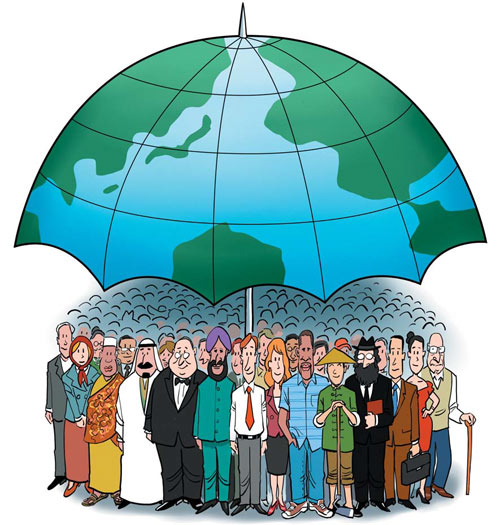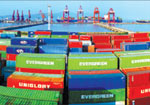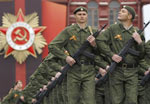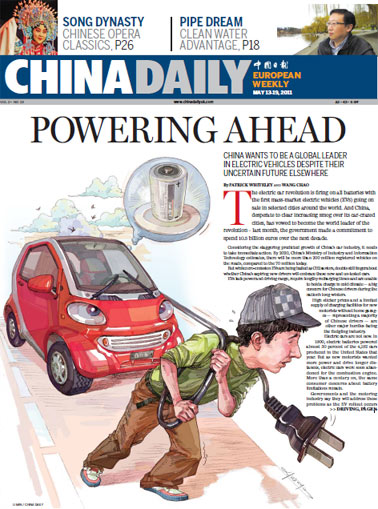The vision of a better future
Updated: 2011-05-13 10:58
By David Gosset (China Daily European Weekly)
From mutually beneficial to mutually transformational Sino-Western relations
|
 |
On May 9, the third round of the China-US Strategic and Economic Dialogue (S&ED) opened in Washington DC, and three days later, Chinese State Councilor Dai Bingguo began a visit to Hungary to co-chair with Catherine Ashton, the High Representative for Foreign Affairs and Security Policy of the European Union, the second China-EU high-level strategic dialogue. In the same month, President of the European Council Herman Van Rompuy is visiting China to have discussions with President Hu Jintao, Premier Wen Jiabao and Vice-President Xi Jinping. These intense Sino-Western diplomatic activities have to be put in perspective.
The vast majority of the discourses on China are characterized by at least one of the four following shortcomings, and sometimes, in surprisingly narrow approaches they combine all of them.
First, one often fails to fully integrate the fact that China's size is in itself of global significance; second, one misinterprets the depth and the nature of China's mutation, this irreversible process is simply the world's major factor of change; third, one fails to take into account the notion that global interdependence will intensify in the foreseeable future, ups and downs will certainly affect globalization but de-globalization has become almost impossible; and fourth, one makes the incomplete assumption that Sino-Western relations have to vary on a scale which spans from mutually antagonistic to mutually beneficial. But another paradigm could serve as both an engine and a compass of our actions - that Sino-Western relations can also be mutually transformational.
In order to make sense of a new reality it is often useful to question our most common instruments of measure and appreciation, to be ready to unlearn available narratives and to relearn with new analytic tools.
In that sense, the Chinese renaissance can not only be understood as a catalyst for globalization, but it does also enlarge the global village by opening new economic, political, diplomatic, intellectual and artistic horizons. China's revival not only widens the Chinese people's representation of the world but it also expands a world system which has been, to a certain extent, contracting for more than five centuries.
The analysis of the interactions between the Chinese renaissance and what can be called the global village's new terrae incognitae is in its infancy, but the way they will be mapped as much as the origin of their cartographers will be highly consequential.
While 21st century China is still facing considerable internal and external challenges, it could be argued that for the very first time in world history a process of globalization and a great economic convergence have truly unified mankind. What will be the West's attitude in this new configuration?
Jacques Attali, former advisor to former French president Francois Mitterrand and first president of the European Bank for Reconstruction and Development as well as prolific writer, has just published another stimulating essay, Tomorrow, who will govern the world?, which is not only a call for better global governance but also an effort to imagine what could be the main features of a world government.
Interestingly, the book introduces very briefly to the Chinese classical concept of tianxia - "all-under-heaven", or universality. It comments on the views of a prominent Chinese economist, Sheng Hong, and presents Beijing's contemporary thinker Zhao Tingyang to Parisian readers.
One the one hand, four paragraphs in direct relation with China for a publication of more than 400 pages can appear of marginal proportion. On the other, what is significant and encouraging is the fct that an influential Western public figure integrates in his latest reflections several terms of the Chinese intellectual debates.
Obviously, despite populist parochialisms, media oversimplifications and the unavoidable posturing of politicians, the great dialogue between the West and China is unfolding. This dialogue matters enormously and has to be cultivated in all segments of our societies.
The ability of the West to understand China's revival and to react constructively to the new dimensions it entails will not only impact its own future but will also shape the landscape of the 21st century global village.
As an epigraph to his Post-American World (2008), commentator Fareed Zakaria has chosen a quotation from Toynbee's magnum opus Study of History (1934-1961), which is of great relevance for those who reflect upon China's re-emergence and its effects on the world's redistribution of power:
"Growth takes place whenever a challenge evokes a successful response that, in turn, evokes a further and different challenge. We have not found any intrinsic reason why this process should not repeat itself indefinitely, even though a majority of civilizations have failed, as a matter of historical fact."
In the coming decades, if the West responds wisely to the Chinese rise, it will grow, and Sino-Western synergy could ideally take the global system at another level, but if Western elites - the "creative minority" in Toynbee's terminology - fail to measure and embrace China's metamorphosis, the West will lose momentum and the scenario of a cooperative world will look more and more improbable.
In a situation of perceived loss and decline, the West would certainly develop an irrational fear of China and one would take the risk to enter the tragic logic famously described by Thucydides to explain the Peloponnesian conflict: "Athens' rise and the alarm it inspired in Lacedaemon made war inevitable".
Fundamentally, the West faces a choice between vain short-term maneuvers to conserve an impossible status quo and the generous but arduous effort of a recreation of itself in a deeply changing environment. In other words, either it becomes a relatively passive observer of the power rearrangement or it changes with the Chinese revival, either in a conservative and defensive reaction it exhausts its resources to preserve a situation which cannot in any case be frozen, or it participates in an energizing movement to a larger process of transformation. Tancredi's words addressed to the Prince of Salina in Lampedusa's Leopard are a guide for action in a time of inevitable mutation: "If we want things to stay as they are, things will have to change".
While Sino-centric or Western-centric politics could lead to endless tensions or even conflicts, cosmopolitan thinking and actions would take us always closer to peace and development. Contrary to what partial examinations can suggest, China is not an obstacle to a period of global enlightenment.
Almost 80 years ago, Chinese thinker and diplomat Hu Shi (1891-1962) introduced in his Haskell lectures a highly valuable framework to make sense of Chinese post-imperial dynamics: "Slowly, quietly, but unmistakably, the Chinese renaissance is becoming a reality".
China's traditional secularism and humanism have in the past inspired the West. Diplomat and man of letters Zhang Pengchun (1892-1957), who served as vice-chairman of the United Nations Commission on Human Rights and played a pivotal role in drafting the 1948 Universal Declaration of Human Rights, noted during the debates chaired by Eleanor Roosevelt: "In the 18th century when progressive ideas with respect to human rights had been first put forward in Europe, translations of Chinese philosophers had been known to and had inspired such thinkers as Voltaire, Quesnay and Diderot in their humanistic revolt against feudalistic conceptions".
As six centuries ago the Italian renaissance reaffirmed man's central position and opened a period of progress, creativity and innovation for the European continent, the Chinese renaissance can signal a 21st century world humanistic movement. In that sense, China's re-emergence should not be perceived as a threat but as one of the major catalysts of a new axial period. In his All-under-Heaven System (2005), Zhao Tingyang aims to "rethink China" in "recovering China's own ability to think, reconstructing its world views, values and methodologies, and thinking about China's future, Chinese concepts about the future and China's role and responsibilities in the world". While the Chinese intellectuals "rethink China", the West has certainly to question its own narratives on a civilization-State which has embarked in a process of economic modernization, socio-political reforms, cultural metamorphosis and of discovery of the world.
Jacob Burckhardt's classic The Civilization of the Renaissance in Italy (1860) presents a chapter on "the discovery of the world and of man" (part IV) whose opening is a powerful synthesis: "Freed from the countless bonds which elsewhere in Europe checked progress, having reached a high degree of individual development and been schooled by the teachings of antiquity, the Italian mind now turned to the discovery of the outward universe, and to the representation of it in speech and in form".
What strikes today's Burckhardt reader is the fact that his words are also mutatis mutandis the outlines of the Chinese contemporary dynamics: Economic development, individual emancipation, re-interpretation of the Chinese tradition have created the conditions of China's journeys to the world.
David Gosset is director of the Euro-China Center for International and Business Relations at China Europe International Business School, Shanghai & Beijing, and founder of the Euro-China Forum.
E-paper

War of the roses
European Chinese rose growers are beating their Chinese rivals at their own game
Preview of the coming issue
High-tech park gets big boost
At the source
Specials

New wave
Coastal city banks on marine sector to ride next stage of economic development

Drunk driving
Drunk drivers face a detention for one to six months and a revokation of their drivers' license.

V-Day parade
A military parade marking the 66th anniversary of the Soviet victory over Nazi.
